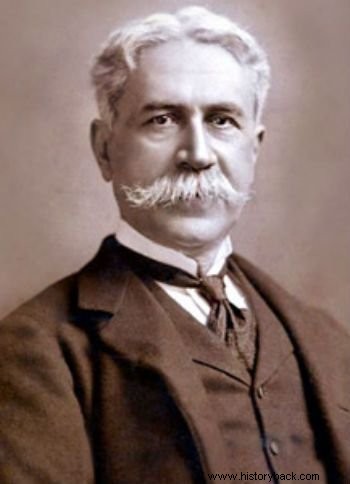Joaquim Nabuco represented one of the most important figures in the abolitionist movement in Brazil for the liberation of slaves.
He excelled in politics, literature, history, and a diplomatic career.
He was a member of the Brazilian Historical Institute and one of the creators of the Brazilian Anti-slavery Society (1880) and of the Brazilian Academy of Letters (1897), of which he was the founder of chair No. 27.
Biography of Joaquim Nabuco
Joaquim Aurélio Barreto Nabuco de Araújo was born in Cabo de Santo Agostinho, Recife, Pernambuco, on August 19, 1849.
He was the son of José Tomás Nabuco de Araújo Filho, senator of the Empire, and of Ana Benigna de Sá Barreto Nabuco de Araújo.
He spent his childhood at Engenho de Massangana, in Pernambuco, consisting of the Casa-Grande and Capela de São Mateus, an important place in the construction of his anti-slavery and libertarian ideals.
In his autobiographical work entitled “My Formation ” (1910), Nabuco describes his impressions after returning to Engenho, years later:
In Rio de Janeiro, Nabuco studied at Colégio Pedro II, becoming a Bachelor of Arts. He later entered the Recife Faculty of Law, completing the course in 1870.
In 1889, he married Evelina Torres Ribeiro, with whom he had five children:Maurício (diplomat), Joaquim (priest), Carolina (writer), Mariana and José Tomas. In 1906, he received the title of Doctor of Letters from Yale University in the United States.

Although he was a monarchist and belonged to a slave-owning family, Joaquim Nabuco fought for the rights of slaves. He was General Deputy of the Province (1878) and later he was elected again Deputy of Pernambuco (1887).
Nabuco had a strong political role, however, he also stood out in his diplomatic career. In London (United Kingdom), he was Minister of the Republic, and in Washington (USA), he held the position of Ambassador of Brazil between 1905 and 1910.
He died in Washington, aged 60, on January 17, 1910, a victim of a congenital disease called “polycythemia vera.”
Abolitionism
Abolitionism was a political and social movement that emerged in Brazil in 1888, of which Joaquim Nabuco was one of the greatest representatives, alongside José do Patrocínio. Together they founded the “Brazilian Society Against Slavery”.
Learn more about Slavery in Brazil.
Works by Joaquim Nabuco
A multifaceted figure, Joaquim Nabuco stood out in literature with an individual, elegant style and a clear language. He was one of the founders of the Academia Brasileira de Letras (ABL) on July 20, 1897.
For many scholars, his capital work is a “Statist of the Empire ”, which recounts the life of his illustrious father, senator of the Empire. He also published literary works in French such as “ L’ Amour is Dieu ” (1874) and “Pensées Detaches et Souvenirs ” (1906).
Thus, Joaquim, who began his literary life at the age of 15, wrote poetry, literary criticism, works of historical content, biographies and memoirs. Some of the works that stand out are:
- Camões and the Lusiads (1872)
- Abolitionism (1883)
- Abolitionist Campaign in Recife (1885)
- The Emperor's Mistake (1886)
- Slaves (1886)
- Why I Remain a Royalist (1890)
- Balmaceda (1895)
- The Duty of Royalists (1895)
- My Formation (1910)
- Literary Writings and Speeches (1901)
Quotes by Joaquim Nabuco
- “True patriotism is what reconciles the homeland with humanity ".
- “The opposition will always be popular; is the dish served to the crowd that does not manage to participate in the banquet .”
- “Consciousness is the last branch of the soul that blossoms; only bears late fruits .”
- “The history of African slavery in America is an unfathomable abyss of degradation and misery .”
- “The Catholic Church, despite its immense power in a country still largely fanaticized by it, has never raised its voice in Brazil in favor of emancipation .”
- “The reign of women may one day come true, but it will be preceded by a general strike of love. The sex that endures this inactivity the longest will eventually triumph over the other. .”
- “One of the greatest scams of our times has been the prestige of the press. Behind the newspaper, we don't see the writers composing their article alone. We see the masses who will read it and who, by sharing this illusion, will repeat it as if it were their own oracle .”
Curiosities
- In honor of the abolitionist, August 19 (date of his birth) is celebrated as the “National Day of the Historian”.
- In Brazil there are many cities with streets, avenues and squares named after the abolitionist:Joaquim Nabuco.
- Nabuco was a great friend and confidant of the writer and one of the founders of the Brazilian Academy of Letters, Machado de Assis (1839-1908).
- Founded in 1949, in the city of Recife, Fundação Joaquim Nabuco, is a cultural and educational historical center, linked to the Ministry of Education, which aims to preserve the historical-cultural legacy left by Nabuco.
Read more about :
- Romanticism in Brazil
- Third Generation Romantic
